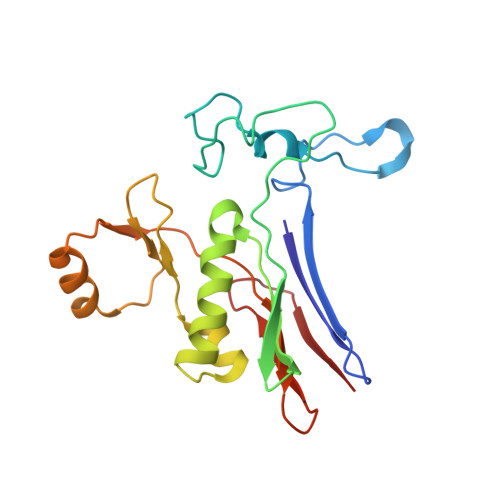Phosphonate-based irreversible inhibitors of human gamma-glutamyl transpeptidase (GGT). GGsTop is a non-toxic and highly selective inhibitor with critical electrostatic interaction with an active-site residue Lys562 for enhanced inhibitory activity
Kamiyama, A., Nakajima, M., Han, L., Wada, K., Mizutani, M., Tabuchi, Y., Kojima-Yuasa, A., Matsui-Yuasa, I., Suzuki, H., Fukuyama, K., Watanabe, B., Hiratake, J.(2016) Bioorg Med Chem 24: 5340-5352
- PubMed: 27622749
- DOI: https://doi.org/10.1016/j.bmc.2016.08.050
- Primary Citation of Related Structures:
5B5T - PubMed Abstract:
γ-Glutamyl transpeptidase (GGT, EC 2.3.2.2) that catalyzes the hydrolysis and transpeptidation of glutathione and its S-conjugates is involved in a number of physiological and pathological processes through glutathione metabolism and is an attractive pharmaceutical target. We report here the evaluation of a phosphonate-based irreversible inhibitor, 2-amino-4-{[3-(carboxymethyl)phenoxy](methoyl)phosphoryl}butanoic acid (GGsTop) and its analogues as a mechanism-based inhibitor of human GGT. GGsTop is a stable compound, but inactivated the human enzyme significantly faster than the other phosphonates, and importantly did not inhibit a glutamine amidotransferase. The structure-activity relationships, X-ray crystallography with Escherichia coli GGT, sequence alignment and site-directed mutagenesis of human GGT revealed a critical electrostatic interaction between the terminal carboxylate of GGsTop and the active-site residue Lys562 of human GGT for potent inhibition. GGsTop showed no cytotoxicity toward human fibroblasts and hepatic stellate cells up to 1mM. GGsTop serves as a non-toxic, selective and highly potent irreversible GGT inhibitor that could be used for various in vivo as well as in vitro biochemical studies.
- Institute for Chemical Research, Kyoto University, Gokasho, Uji, Kyoto 611-0011, Japan.
Organizational Affiliation:



















